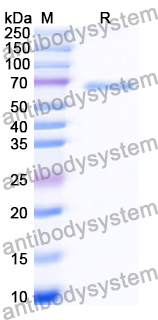Catalog No.
YHE98001
Expression system
E. coli
Species
Homo sapiens (Human)
Protein length
Arg495-Ser1092
Predicted molecular weight
68.00 kDa
Nature
Recombinant
Endotoxin level
Please contact with the lab for this information.
Purity
>90% as determined by SDS-PAGE.
Accession
P53396
Applications
ELISA, Immunogen, SDS-PAGE, WB, Bioactivity testing in progress
Form
Lyophilized
Storage buffer
Lyophilized from a solution in PBS pH 7.4, 0.02% NLS, 1mM EDTA, 4% Trehalose, 1% Mannitol.
Reconstitution
Reconstitute in sterile water for a stock solution. A copy of datasheet will be provided with the products, please refer to it for details.
Shipping
In general, proteins are provided as lyophilized powder/frozen liquid. They are shipped out with dry ice/blue ice unless customers require otherwise.
Stability and Storage
Use a manual defrost freezer and avoid repeated freeze thaw cycles. Store at 2 to 8°C for frequent use. Store at -20 to -80°C for twelve months from the date of receipt.
Alternative Names
ATP-citrate synthase, 2.3.3.8, ATP-citrate (pro-S-)-lyase, ACL, Citrate cleavage enzyme, ACLY
Transcriptomics characteristics and differentiation of subcutaneous adipose tissue among Huainan pigs and its hybrid genetic populations., PMID:40475027
The Nuclear Localization of ACLY Guards Early Embryo Development Through Recruiting P300 and HAT1 to Promote Histone Acetylation and Transcription., PMID:40470746
A feedforward loop between ACLY and MYC supports T-ALL progression in vivo., PMID:40453140
Targeting the STAT3/ACLY axis attenuates pulmonary inflammation but delays Mycoplasma pneumoniae clearance via citrate metabolism., PMID:40434443
Genetic insights support PARP1 as a mediator in the protective association of ATP-citrate lyase inhibitors with melanoma., PMID:40399559
TNFRSF11B-modified umbilical cord mesenchymal stem cells as a novel strategy for bone-related diseases by suppressing osteoclast activity., PMID:40380204
Widespread discordance between mRNA expression, protein abundance and de novo lipogenesis activity in hepatocytes during the fed-starvation transition., PMID:40376090
Transcriptome analysis reveals key genes and signalling pathways related to residual feed intake in meat-type ducks., PMID:40367888
The Effect of Reduced Dietary Protein on Adipose Tissue in Local Krškopolje Pigs., PMID:40362677
Hyperoside modulates bile acid and fatty acid metabolism, presenting a potentially promising treatment for non-alcoholic fatty liver disease., PMID:40349961
RNF180 weakened the lipid droplet formation and subsequent chemoresistance by destabilizing ACC1 and ACLY in esophageal cancer., PMID:40331188
Loss of RET-ROS at complex I induces diastolic dysfunction in mice that is reversed by aerobic exercise., PMID:40327410
Formononetin suppresses colitis-associated colon cancer by targeting lipid synthesis and mTORC2/Akt signaling., PMID:40318528
Genome-wide association studies of the fatty acid composition of Korean native chicken breast meat., PMID:40264524
Impact of fish oil on epigenetic regulation in perirenal adipose tissue of obese mice., PMID:40246605
SIRT3 Represses Vascular Remodeling via Reducing Mitochondrial Ac-CoA Accumulation in Vascular Smooth Muscle Cells., PMID:40242869
RNF112 Facilitates Ubiquitin-Mediated Degradation of c-Myc, Suppressing Proliferation, Migration and Lipid Synthesis in Bladder Cancer., PMID:40178292
Oncogene-induced senescence mitochondrial metabolism and bioenergetics drive the secretory phenotype: further characterization and comparison with other senescence-inducing stimuli., PMID:40158257
Unraveling the molecular mechanisms of Fufangduzhong formula in alleviating high-fat diet-induced non-alcoholic fatty liver disease in mice., PMID:40144651
PI3Kβ functions as a protein kinase to promote cellular protein O-GlcNAcylation and acetyl-CoA production for tumor growth., PMID:40132583
Dual inhibition of hepatic ACLY and ACSS2: A synergistic approach to combat NAFLD through lipogenesis reduction and mitochondrial enhancement., PMID:40127788
Exosomal PKM2: A Noninvasive Diagnostic Marker Linking Macrophage Metabolic Reprogramming to Gastric Cancer Pathogenesis., PMID:40126044
KLHL25-ACLY module functions as a switch in the fate determination of the differentiation of iTreg/Th17., PMID:40119138
Herbal-based Xuebijing injection ameliorated vascular endothelial dysfunction via inhibiting ACLY/MYB/RIG-I axis in sepsis-associated lung injury., PMID:40088739
Causal relationship between drug target genes of LDL-cholesterol and coronary artery disease: drug target Mendelian randomization study., PMID:40082904
ACLY Promotes Cardiac Fibrosis via the Regulation of DNL and Histone Acetylation., PMID:40047081
Inhibition of ATP Citrate Lyase by Hydroxycitrate-Loaded Exosomes Suppresses the Survival of Lung Adenocarcinoma Cells., PMID:40025393
ACLY inhibitor reduced Porphyromonas gingivalis-induced pyroptosis by suppressing microtubules acetylation in macrophages., PMID:39955916
Acetyl-CoA synthesis in the skin is a key determinant of systemic lipid homeostasis., PMID:39932848
LRP11 facilitates lipid metabolism and malignancy in hepatocellular carcinoma by stabilizing RACK1 through USP5 regulation., PMID:39891099
Inhibition of ATP-citrate lyase by bempedoic acid protects against abdominal aortic aneurysm formation in mice., PMID:39889383
SLC25A1 and ACLY maintain cytosolic acetyl-CoA and regulate ferroptosis susceptibility via FSP1 acetylation., PMID:39881208
MOSPD1 facilitates fatty acid metabolism and gastric cancer progression by promoting the MAPK pathway., PMID:39864210
Mitochondria-Related Genome-Wide Mendelian Randomization Identifies Putatively Causal Genes for Neurodegenerative Diseases., PMID:39838927
SLC13A2 promotes hepatocyte metabolic remodeling and liver regeneration by enhancing de novo cholesterol biosynthesis., PMID:39824985
Effect of SNORD113-3/ADAR2 on glycolipid metabolism in glioblastoma via A-to-I editing of PHKA2., PMID:39794701
HIF-2α/LPCAT1 orchestrates the reprogramming of lipid metabolism in ccRCC by modulating the FBXW7-mediated ubiquitination of ACLY., PMID:39781455
The Combination of Resveratrol and Conjugated Linoleic Acid Dienes Enhances the Individual Effects of These Molecules on De Novo Fatty Acid Biosynthesis in 3T3-L1 Adipocytes., PMID:39769194
The multifaceted anti-atherosclerotic properties of herbal flavonoids: A comprehensive review., PMID:39701504
Momordicine-I suppresses head and neck cancer growth by modulating key metabolic pathways., PMID:39696286
Chaperone-mediated autophagy as a modulator of aging and longevity., PMID:39687864
New Insight into the Related Candidate Genes and Molecular Regulatory Mechanisms of Waterlogging Tolerance in Tree Peony Paeonia ostii., PMID:39683117
Antifungal activity of bamemacrolactine C against Talaromyces marneffei and its possible mechanisms of action., PMID:39656856
Nutrient-driven histone code determines exhausted CD8+ T cell fates., PMID:39666821
ATP citrate lyase drives vascular remodeling in systemic and pulmonary vascular diseases through metabolic and epigenetic changes., PMID:39661707
Mitochondrial CLPB is a pro-survival factor at the onset of granulocytic differentiation of mouse myeloblastic cells., PMID:39644357
Role of ATP citrate lyase and its complementary partner on fatty acid synthesis in gastric cancer., PMID:39627427
Lipid-lowering therapies for aortic stenosis: a drug-target Mendelian randomization study., PMID:39611306
Nucleo-cytosolic acetyl-CoA drives tumor immune evasion by regulating PD-L1 in melanoma., PMID:39602308
RBM15 promotes lipogenesis and malignancy in gastric cancer by regulating N6-Methyladenosine modification of ACLY mRNA in an IGF2BP2-dependent manner., PMID:39549859

